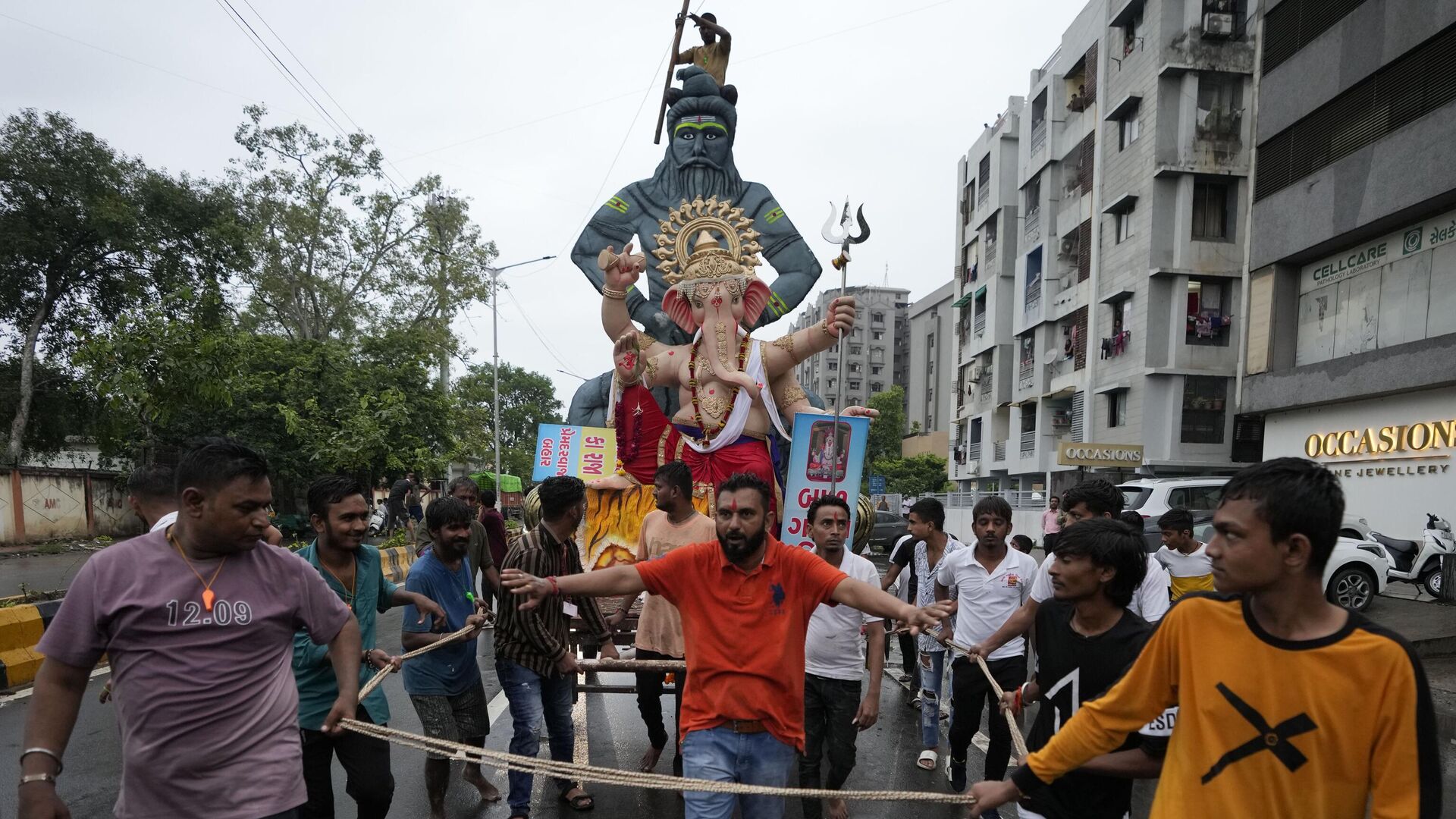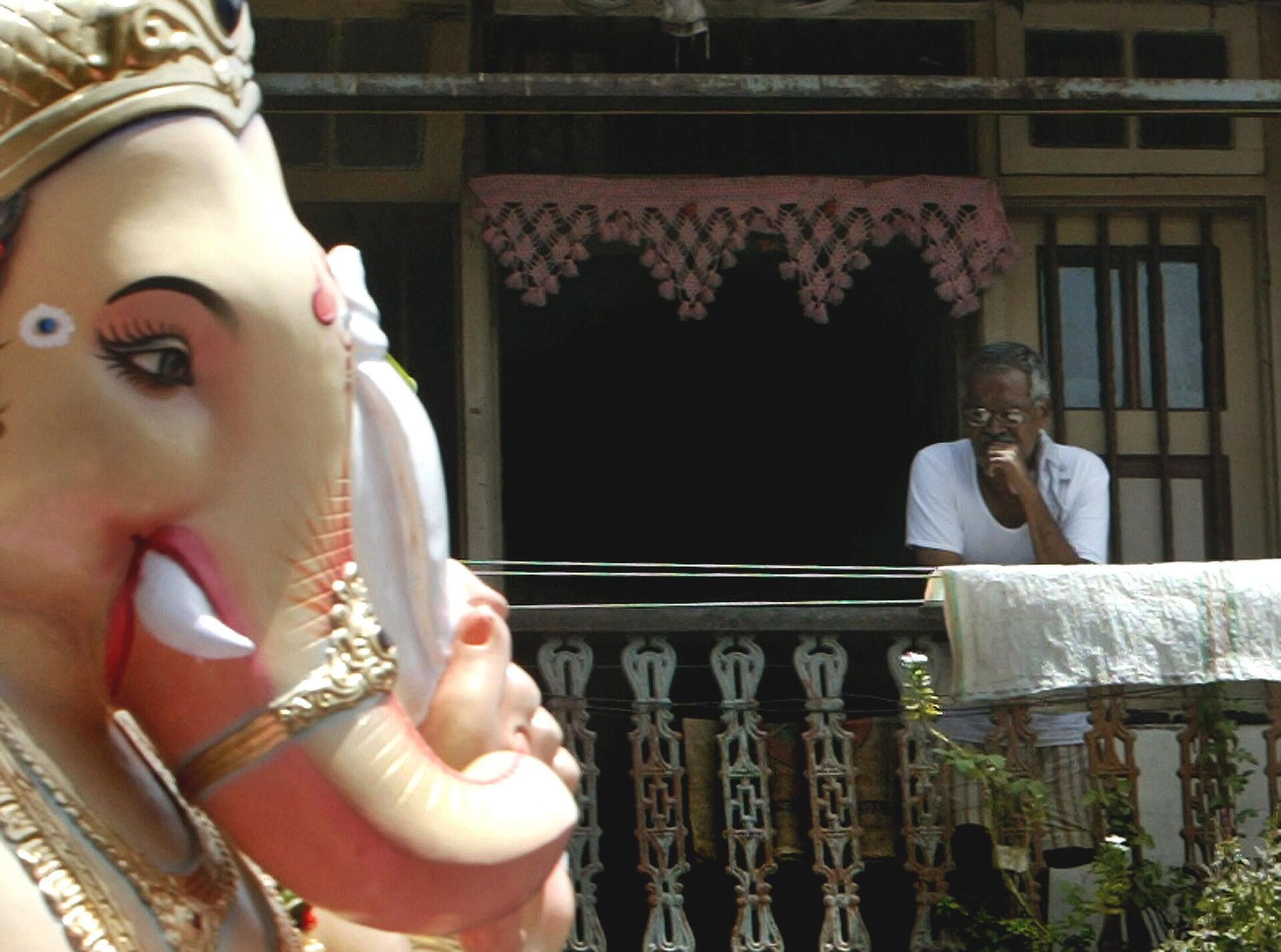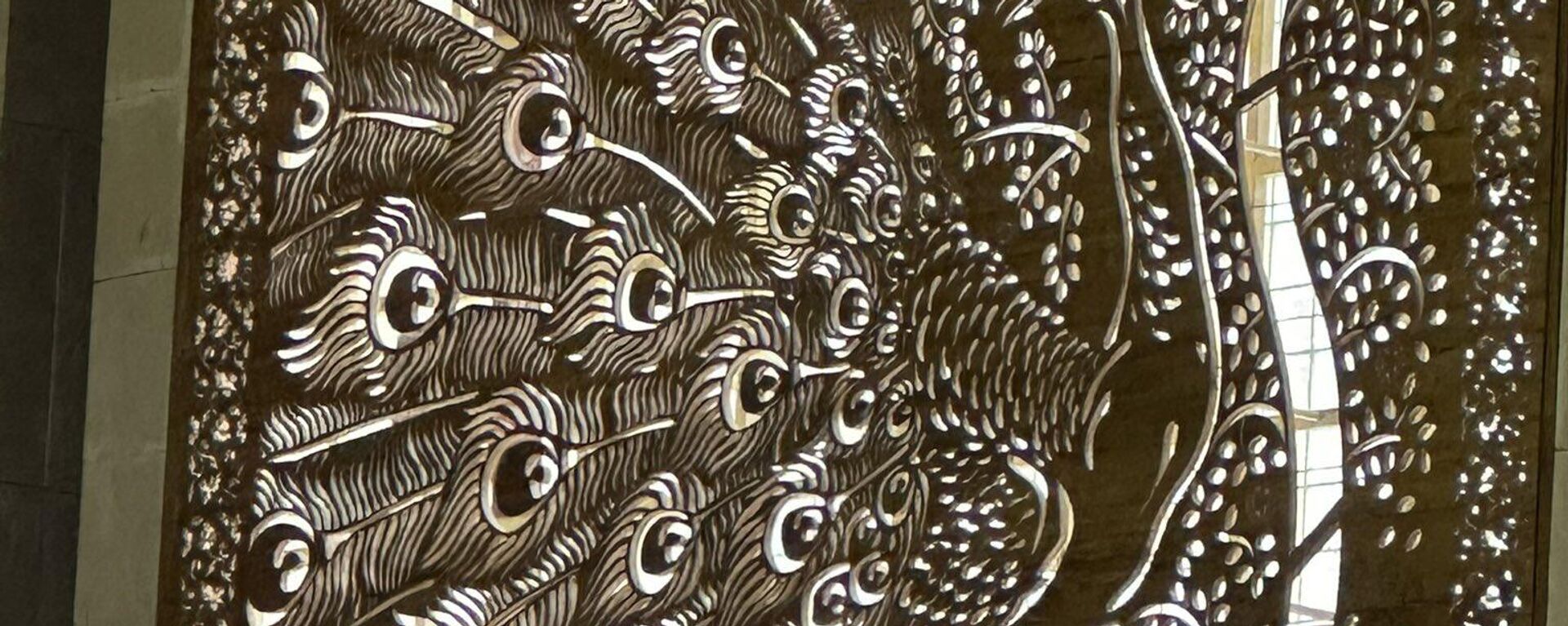https://sputniknews.in/20230920/ganesh-chaturthi-why-delhis-idol-makers-missing-out-on-cheer-during-festive-season-4334062.html
Ganesh Chaturthi: Why Delhi's Idol-Makers Missing Out on Cheer During Festive Season
Ganesh Chaturthi: Why Delhi's Idol-Makers Missing Out on Cheer During Festive Season
Sputnik India
While millions of Hindus await the 10-day 'Ganesh Chaturthi' festival out of deep reverence, for local idol-maker families it is the most challenging time that determines how they will live for the rest of the year.
2023-09-20T11:12+0530
2023-09-20T11:12+0530
2023-09-20T16:33+0530
sputnik exclusives
delhi
india
hindu festival
art
culture
woke culture
hindu goddess kali
hindu
hindu devotees
https://cdn1.img.sputniknews.in/img/07e7/09/14/4340284_0:0:3072:1728_1920x0_80_0_0_0c75747ef8e13a6ceed342eb700c5da1.jpg
Away from the hustle and bustle, and cacophony of traffic, thousands of migrant sculptors in Delhi silently work in dingy shanties or on pavements throughout the year, creating some fascinating pieces of art.Their creations help residents celebrate the religious festivals with fervour.On the opening day of the 10-day 'Ganesh Chaturthi', Sputnik India visited a big hub of sculptors at Delhi's Pratap Bagh area, near Gurdwara Nanak Piao Sahib and explored the life of idol-makers on their most awaited festival of the year.Ganesha Chaturthi: Delhi's Rain Playing a Damp SquibRani, one of the middle-aged idol makers, rued the rains this time. Her family suffered badly due to poor sales ahead of the festival. It was not that they couldn't sell enough, rather they failed to even prepare enough Ganesha statues."We kept shifting the idols, kept on roadsides, from one place to another. My family couldn't even paint at least 100 idols, which are still lying unfinished," she said.Life of Idol MakersGenerally, these sculptors remain occupied making different idols for 12 key festivals of the year. But the biggest remains the Ganesha festival, when they have high hopes of a good income due to widespread demand.Generally, preparations for the Ganesha festival commence from the festival of colors: Holi (March onward) itself. Once the basic structures are created, painting is done with vibrant colors and just ahead of the main day 'Ganesha Chaturthi', the finishing touch is given.Ramdas, is a sculptor who has been making idols for 30 years. He usually borrows money ahead of festive occasions and then makes statues of Gods and Goddesses. His kids and wife work along with him as a family unit for a better income."I have suffered a loss of INR 275,000 ($3,300 approx.). I don't know how I manage things this time around. But still I am not crying. I have faith in God," he stated.When There's No Festive Occasion AroundSuresh is another idol maker, hailing from the state of Rajasthan but has been living in Delhi for over three decades.Asked how he manages to earn a living during the lean period of the year, he said: "During the regular weeks of the year, I take up any small work or drive a bicycle-rickshaw to earn INR 500 a day. My wife takes up household work at private houses, that earns her INR 3,000 a month."Bread & Butter Over Personal HealthAsked why he was delaying a visit to the doctor, he said: "I know I need to get injected to prevent infection in my body. But there's nobody to take care of the idols and customers. I can't afford to avoid any customer this time."Facing the 'High Cost But Low Selling Price' ChallengeRaju, 50, another idol maker, complained of confronting a dull period this year. Talking to Sputnik India, he shared how every year he purchases various clay idols from Kolkata city in the West Bengal state. And the rest are made of P.O.P (plaster of paris) in Delhi itself. But he experienced a tough time this season.He said it's like clearing the stock this time somehow despite not making much profit. "Otherwise, any leftover article would prove a complete waste for us."People Want Gov't to Support Roadside ArtisansAkash, a young customer who was visiting the market along with neighborhood youngsters to buy a Ganesha idol, shared his experience with Sputnik India. He said after worshipping the Ganesha idol in their locality for the 10 days of Ganesha Chaturthi, this statue would be immersed in the River Yamuna with big fanfare in a religious procession amid religious chants of 'Ganapati Bappa Morya'. "I have come to the market to buy this 5-foot high Ganesha idol to later worship for 10 days at home. It has cost us INR 5,500 ($66).He was emotionally impacted upon seeing the kind of rough conditions, so many artists are compelled to work in. "They don't seem to have taken their meals today, after working day and night for many weeks for this day of high sale."He along with his friends wished the government authorities would support such exceptionally talented artists and help them from working in such difficult conditions.Modi's Support for CraftsmenIn view of the hardships, artisans often face in different parts of the country, Prime Minister Narendra Modi recently launched the INR 130 billion ($1.5 billion) Pradhan Mantri Vishwakarma Yojana (PMVY). It aims to equip craftspeople with the technology to augment their skills for today's market. The scheme is in an endeavour to mount the accessibility and quality of products and services offered by traditional artisans and craftspersons. It offers collateral-free enterprise development loans of INR 100,000 ($1,201) (first tranche to be repaid within 18 months) and INR 200,000 ($2,403) (that can be repaid in 30 months for the second tranche). The Indian Prime Minister asserted his government's commitment to uplift the nation's craftspeople and artisans. Inaugurating the first phase of the $648 million worth ‘Yashobhoomi’ (a state-of-the-art India International Convention and Expo Centre) at Delhi's Dwarka area, Modi dedicated it to every labourer, that is, every ‘Vishwakarma’ (craftsman).
https://sputniknews.in/20230531/how-900-indian-carpet-weavers-spun-artistic-motifs--designs-to-adorn-new-parliament-2259905.html
delhi
india
Sputnik India
feedback.hindi@sputniknews.com
+74956456601
MIA „Rossiya Segodnya“
2023
Sandeep Datta
https://cdn1.img.sputniknews.in/img/07e7/04/07/1468069_0:258:1800:2058_100x100_80_0_0_3909870b82375b0693e9fd27915facc3.jpg
Sandeep Datta
https://cdn1.img.sputniknews.in/img/07e7/04/07/1468069_0:258:1800:2058_100x100_80_0_0_3909870b82375b0693e9fd27915facc3.jpg
News
en_IN
Sputnik India
feedback.hindi@sputniknews.com
+74956456601
MIA „Rossiya Segodnya“
Ganesh Chaturthi
Sputnik India
Ganesh Chaturthi
2023-09-20T11:12+0530
true
PT1M44S
Sputnik India
feedback.hindi@sputniknews.com
+74956456601
MIA „Rossiya Segodnya“
Sandeep Datta
https://cdn1.img.sputniknews.in/img/07e7/04/07/1468069_0:258:1800:2058_100x100_80_0_0_3909870b82375b0693e9fd27915facc3.jpg
when is ganesh chaturthi, when is ganesh visarjan, where to buy ganesh idols in delhi, ganesh idol makers, who is ganesh ji, when is ganesh visarjan in 2023, who makes idols and stautues, when is ganesh chaturthi in 2020 in india, what is vishwakarma loan scheme, what is vishwakarma scheme eligibility, vishwakarma shram samman yojana list, how ganesh chaturthi is celebrated, how ganesh chaturthi starte, ganapati chants, how ganesh idols are immersed, why people celebrate ganesh festival, why people celebrate ganesh chaturthi
when is ganesh chaturthi, when is ganesh visarjan, where to buy ganesh idols in delhi, ganesh idol makers, who is ganesh ji, when is ganesh visarjan in 2023, who makes idols and stautues, when is ganesh chaturthi in 2020 in india, what is vishwakarma loan scheme, what is vishwakarma scheme eligibility, vishwakarma shram samman yojana list, how ganesh chaturthi is celebrated, how ganesh chaturthi starte, ganapati chants, how ganesh idols are immersed, why people celebrate ganesh festival, why people celebrate ganesh chaturthi
Ganesh Chaturthi: Why Delhi's Idol-Makers Missing Out on Cheer During Festive Season
11:12 20.09.2023 (Updated: 16:33 20.09.2023) While millions of Hindus await the 10-day 'Ganesh Chaturthi' festival out of deep reverence, for local idol-making families it is the most challenging time that determines how they will live for the rest of the year.
Away from the hustle and bustle, and cacophony of traffic, thousands of migrant sculptors in Delhi silently work in dingy shanties or on pavements throughout the year, creating some fascinating pieces of art.
Their creations help residents celebrate the religious festivals with fervour.
On the opening day of the 10-day
'Ganesh Chaturthi',
Sputnik India visited a big hub of sculptors at Delhi's Pratap Bagh area, near Gurdwara Nanak Piao Sahib and explored the life of idol-makers on their most awaited
festival of the year.
Ganesha Chaturthi: Delhi's Rain Playing a Damp Squib
Rani, one of the middle-aged idol makers, rued the rains this time. Her family suffered badly due to poor sales ahead of the festival. It was not that they couldn't sell enough, rather they failed to even prepare enough Ganesha statues.
She said the main challenge was posed by untimely rains and the recent three-day Delhi shutdown just days ahead of the peak time to work on idols, giving final touches.
"We kept shifting the idols, kept on roadsides, from one place to another. My family couldn't even paint at least 100 idols, which are still lying unfinished," she said.
Rani, the mother of nine kids, said her family took private loans to buy the material. "But no matter what we manage to sell off, we have to return the full money at any cost along with its high interest."
Generally, these sculptors remain occupied making different idols for 12 key festivals of the year. But the biggest remains
the Ganesha festival, when they have high hopes of a good income due to widespread demand.
Generally, preparations for the Ganesha festival commence from the festival of colors: Holi (March onward) itself. Once the basic structures are created, painting is done with vibrant colors and just ahead of the main day 'Ganesha Chaturthi', the finishing touch is given.
Ramdas, is a sculptor who has been making idols for 30 years. He usually borrows money ahead of festive occasions and then makes statues of Gods and Goddesses. His kids and wife work along with him as a family unit for a better income.
"This time too I borrowed a million rupees ($12,000 approx.) funds on interest. But it rained days ahead of the festive day and it didn't stop for a long time. It incurred a heavy loss for me. This time, I feel ruined."
"I have suffered a loss of INR 275,000 ($3,300 approx.). I don't know how I manage things this time around. But still I am not crying. I have faith in God," he stated.
When There's No Festive Occasion Around
Suresh is another idol maker, hailing from the state of Rajasthan but has been living in Delhi for over three decades.
Asked how he manages to earn a living during the lean period of the year, he said: "During the regular weeks of the year, I take up any small work or drive a bicycle-rickshaw to earn INR 500 a day. My wife takes up household work at private houses, that earns her INR 3,000 a month."
Bread & Butter Over Personal Health
Lifting his right feet, Suresh showed a big cut that he suffered two days ago due to an iron-nail piercing. But he was reluctant to visit a doctor, even for free help at a government hospital.
Asked why he was delaying a visit to the doctor, he said: "I know I need to get injected to prevent infection in my body. But there's nobody to take care of the idols and customers. I can't afford to avoid any customer this time."
Facing the 'High Cost But Low Selling Price' Challenge
Raju, 50, another idol maker, complained of confronting a dull period this year. Talking to Sputnik India, he shared how every year he purchases various clay idols from Kolkata city in the West Bengal state. And the rest are made of P.O.P (plaster of paris) in Delhi itself. But he experienced a tough time this season.
"The customers need articles at the cheapest possible rates. But our basic material's cost is quite high. Customers are bargaining to get things even below our actual cost."
He said it's like clearing the stock this time somehow despite not making much profit. "Otherwise, any leftover article would prove a complete waste for us."
People Want Gov't to Support Roadside Artisans
Akash, a young customer who was visiting the market along with neighborhood youngsters to buy a Ganesha idol, shared his experience with Sputnik India.
He said after worshipping the Ganesha idol in their locality for the 10 days of Ganesha Chaturthi, this statue would be immersed in the River Yamuna with big fanfare in a religious procession amid religious chants of 'Ganapati Bappa Morya'.
"I have come to the market to buy this 5-foot high Ganesha idol to later worship for 10 days at home. It has cost us INR 5,500 ($66).
He was emotionally impacted upon seeing the kind of rough conditions, so many artists are compelled to work in. "They don't seem to have taken their meals today, after working day and night for many weeks for this day of high sale."
"We just feel these artists deserve a better place to make these idols of Gods. These people are working and living in this place surrounded by garbage. They deserve a proper place for such work," the 28-year-old stated.
He along with his friends wished the government authorities would support such exceptionally talented artists and help them from working in such difficult conditions.
Modi's Support for Craftsmen
In view of the hardships, artisans often face in different parts of the country, Prime Minister Narendra Modi recently launched the INR 130 billion ($1.5 billion) Pradhan Mantri Vishwakarma Yojana (PMVY).
It aims to equip craftspeople with the technology to augment their skills for today's market. The scheme is in an endeavour to mount the accessibility and quality of products and services offered by traditional artisans and craftspersons.
It offers collateral-free enterprise development loans of INR 100,000 ($1,201) (first tranche to be repaid within 18 months) and INR 200,000 ($2,403) (that can be repaid in 30 months for the second tranche).
The Indian Prime Minister asserted his government's commitment to uplift the nation's craftspeople and artisans.
Inaugurating the first phase of the $648 million worth ‘Yashobhoomi’ (a state-of-the-art India International Convention and Expo Centre) at Delhi's Dwarka area, Modi dedicated it to every labourer, that is, every ‘Vishwakarma’ (craftsman).




